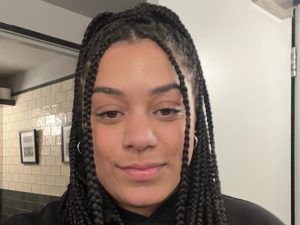Purrble: The Research So Far

By Nkem M Naeche, member of Sprouting Minds Young Person’s Advisory Group
Purrble: The research so far.
GOV.UK’s Safety in the Children and Young People Secure Estate Official statistics (2022), revealed that the annualised rate of self-harm incidents per 100 children and young people per year was 371 in the 3 months April to June 2022. This was an increase of 8% compared to the same period last year. Self-harm is defined as someone intentionally damaging, injuring, or poisoning their body (NICE, 2011). Reasons people engage in self-harm include trying to feel in control, internal punishment and a way of relieving tension. Young people who self-harm often do so as they find coping with their emotions (emotion regulation) difficult. This lack of emotional regulation during a period of emotional distress then translates to the harmful behaviour to self harm.
Results of the pilot studies.
Within this sector of mental health research, I have been collaborating as a part of the Digital Youth research programme and Sprouting Minds young person’s advisory group, with researchers Jess, Petr and Ellen, who work with a co-designed fluffy robot called Purrble. This robot is currently being used as an emotion regulation intervention for young people who may be struggling with self-harm. The project is ‘Robots to support emotional regulation for young people at risk of self-harm’ and is also known as work package 7 (WP7) in the Digital Youth with Sprouting Minds collaboration. The aim of their study is to understand the feasibility and acceptability of using Purrble with young people at-risk of self-harm. There is a higher prevalence of self-harm among LGBTQ+ and Black, Asian and Minority Ethnic (BAME) young people and the team selected to primarily look into these two populations. Amazingly, Jess and Petr have been able to carry out 2 pilot studies, one for each group, which found that over a 3-week trial, LGBTQ+ young people had a decrease in anxiety and depressive symptoms, emotional regulation strategies increased and the rates of self-harm thoughts decreased by 21%. The results of the pilot studies indicated that LGBTQ+ youth were more receptive to using Purrble with positive results compared to ethnic racial minority young people.
Ethnic considerations for impact of Purrble.
As a young person working with WP7 and Purrble, the results of the pilot study are surprising and discussion between Jess, myself and another member of Sprouting Minds collaborating on this project has sparked incredibly thought provoking considerations for the continued success of Jess and Petr’s research. During a recent discussion, I considered the many reasons why Purrble worked better for the group of young LGBTQ people compared to the BAME young people. One thought being mental health and self-harm may be taboo in some ethnic or racial minority groups. Research shows BAME people can face barriers to getting help, including not recognising they have a mental illness because mental health was stigmatised or never talked about in their community. As a mixed race young woman of Nigerian and Italian descent, I found this unsurprising. Gbenga Okulate, a Psychiatrist with the Nigeria Military Hospital Yaba (NMHY), has identified stress as the major cause of mental and physical illnesses in Nigeria and as of 2020, depression, schizophrenia and psychoses were the most common mental health disorders in Italy. In a 2013 study conducted in Italy, identifying public beliefs and attitudes towards depression, 75% of the sample shared the widespread belief that people suffering from depression should avoid talking about their problem (Munizza et al., 2013). In addition, a small sample also viewed depression as a mental health condition that should be managed without assistance from external sources. Referring oneself to a primary care physician was also considered embarrassing and there was a belief that primary care physicians were too busy to treat patients suffering from depression. Inclusion of ethnic considerations, public beliefs and attitudes, mental health discussions and its importance have only recently surged within the last decade or so and harmful stigma of anxiety, depression and self harm continue. We considered that the BAME participants may have been hyper aware of an intervention like Purrble and were less likely to use it at home or in public spaces.
This conversation stemmed from a comment an interview participant made in which mental health was not talked about or addressed in the home. The question then is, if participants feel unable to discuss their own mental health and may be unable to recognise its symptoms, are they able to be present and address these mental health concerns when trying to use an intervention like Purrble which requires active participation?
Given the results of the pilot study, researchers Jess and Petr wish to conduct further research into effective interventions for ethnic and racial young people and focus their main resources on exploring further impact of Purrble with LGBTQ+ young people.
My own involvement.
As an invited and interested member in this research, I represent the groups studied to champion the work done by Jess and Petr. In the time I have been a part of the study, I have worked to liaise with Jess monthly on the progression of the project and consult on considerations she has for ongoing work, representing the voice of the targeted study groups. This work has included discussions on the results of the pilot studies and will include documentation review, social media content creation as well as safeguarding and ethical considerations for youth involved in the study portions of the project.
I look forward to continuing working with WP7 on the success of Purrble and the encouraging positive impact Purrble will have on youth at risk of self-harm.
About the author
Nkem M Naeche is a member of Sprouting Minds and works with a number of research projects across the Digital Youth programme including the Purrble project. This blog expresses the personal views and lived experience of Nkem M Naeche, and does not represent the opinion of Sprouting Minds or the UKRI Digital Youth Programme. If you were affected by this blog and would like to seek advice and support around issues it raised you can contact the following links:


